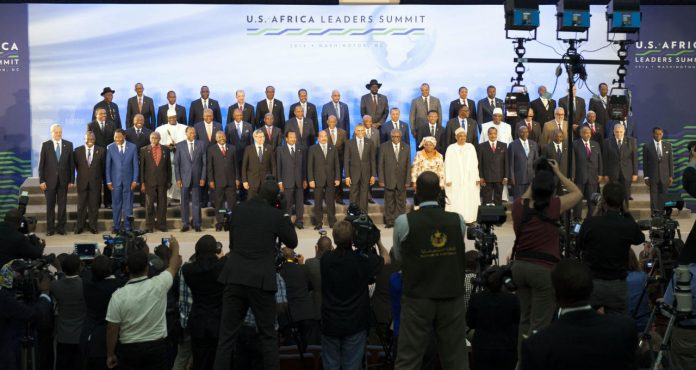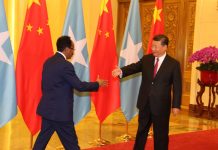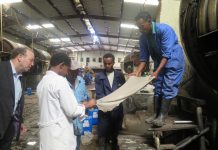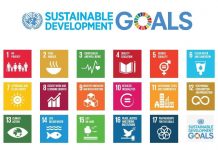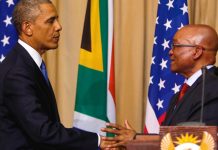As I think everyone knows by now, this first U.S.-Africa Leaders Summit has been the largest gathering we’ve ever hosted with African heads of state and government — and that includes about 50 motorcades. So I want to begin by thanking the people of Washington, D.C. for helping us host this historic event — and especially for their patience with the traffic.
As I’ve said, this summit reflects the reality that even as Africa continues to face great challenges we’re also seeing the emergence of a new, more prosperous Africa. Africa’s progress is being led by Africans, including leaders here today. I want to take this opportunity again to thank my fellow leaders for being here. Rather than a lot of prepared speeches, our sessions today were genuine discussions — a chance to truly listen and to try to come together around some pragmatic steps that we can take together. And that’s what we’ve done this week.
First, we made important progress in expanding our trade. The $33 billion in new trade and investments that I announced yesterday will help spur African development and support tens of thousands of American jobs. With major new commitments to our Power Africa initiative, we’ve tripled our goal and now aim to bring electricity to 60 million African homes and businesses. And today I reiterated that we’ll continue to work with Congress to achieve a seamless and long-term renewal of the African Growth and Opportunity Act.
We agreed that Africa’s growth depends, first and foremost, on continued reforms in Africa, by Africans. The leaders here pledged to step up efforts to pursue reforms that attract investment, reduce barriers that stifle trade — especially between African countries — and to promote regional integration. And as I announced yesterday, the United States will increase our support to help build Africa’s capacity to trade with itself and with the world.
Ultimately, Africa’s prosperity depends on Africa’s greatest resource — its people. And I’ve been very encouraged by the desire of leaders here to partner with us in supporting young entrepreneurs, including through our Young African Leaders Initiative. I think there’s an increasing recognition that if countries are going to reach their full economic potential, then they have to invest in women — their education, their skills, and protect them from gender-based violence. And that was a topic of conversation this afternoon. And this week the United States announced a range of initiatives to help empower women across Africa.
Our New Alliance for Food Security and Nutrition continues to grow, aiming to lift 50 million Africans from poverty. In our fight against HIV/AIDS, we’ll work with 10 African countries to help them double the number of their children on lifesaving anti-retroviral drugs. And even as the United States is deploying some of our medical first responders to West Africa to help control the Ebola outbreak, we’re also working to strengthen public health systems, including joining with the African Union to pursue the creation of an African Centers for Disease Control.
I also want to note that the American people are renewing their commitment to Africa. Today, InterAction — the leading alliance of American NGOs — is announcing that over the next three years its members will invest $4 billion to promote maternal health, children’s health, and the delivery of vaccines and drugs. So this is not just a government effort, it is also an effort that's spurred on by the private sector. Combined with the investments we announced yesterday — and the commitments made today at the symposium hosted by our spouses — that means this summit has helped to mobilize some $37 billion for Africa’s progress on top of, obviously, the substantial efforts that have been made in the past.
Second, we addressed good governance, which is a foundation of economic growth and free societies. Some African nations are making impressive progress. But we see troubling restrictions on universal rights. So today was an opportunity to highlight the importance of rule of law, open and accountable institutions, strong civil societies, and protection of human rights for all citizens and all communities. And I made the point during our discussion that nations that uphold these rights and principles will ultimately be more prosperous and more economically successful.
In particular, we agreed to step up our collective efforts against the corruption that costs African economies tens of billions of dollars every year — money that ought to be invested in the people of Africa. Several leaders raised the idea of a new partnership to combat illicit finance, and there was widespread agreement. So we decided to convene our experts and develop an action plan to promote the transparency that is essential to economic growth.
Third, we’re deepening our security cooperation to meet common threats, from terrorism to human trafficking. We’re launching a new Security Governance Initiative to help our African countries continue to build strong, professional security forces to provide for their own security. And we’re starting with Kenya, Niger, Mali, Nigeria, Ghana and Tunisia.
During our discussions, our West African partners made it clear that they want to increase their capacity to respond to crises. So the United States will launch a new effort to bolster the regions early warning and response network and increase their ability to share information about emerging crises.
We also agreed to make significant new investments in African peacekeeping. The United States will provide additional equipment to African peacekeepers in Somalia and the Central African Republic. We will support the African Union’s efforts to strengthen its peacekeeping institutions. And most importantly, we’re launching a new African peacekeeping rapid response partnership with the goal of quickly deploying African peacekeepers in support of U.N. or AU missions. And we’ll join with six countries that in recent years have demonstrated a track record as peacekeepers — Ghana, Senegal, Rwanda, Tanzania, Ethiopia and Uganda. And we’re going to invite countries beyond Africa to join us in supporting this effort, because the entire world has a stake in the success of peacekeeping in Africa.
In closing, I just want to say that this has been an extraordinary event, an extraordinary summit. Given the success that we’ve had this week, we agreed that summits like this can be a critical part of our work together going forward, a forcing mechanism for decisions and action. So we agreed that the U.S.-Africa Leaders Summit will be a recurring event to hold ourselves accountable for our commitments and to sustain our momentum. And I’ll strongly encourage my successor to carry on this work, because Africa must know that they will always have a strong and reliable partner in the United States of America.
The above are President Obama’s opening remarks at the press conference following the U.S.-Africa Leaders Summit in Washington, D.C., Aug. 6, 2014.


